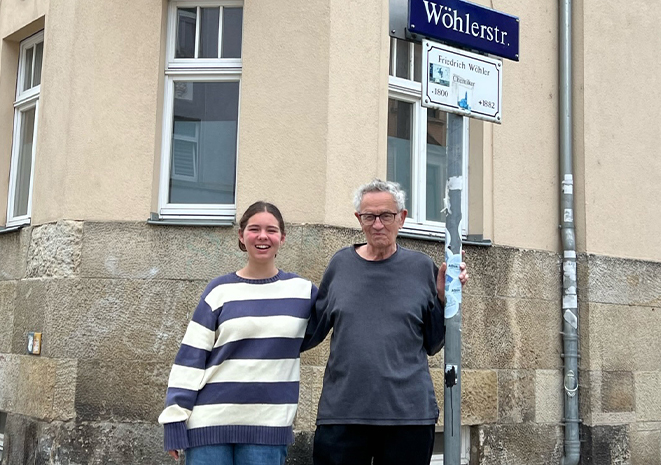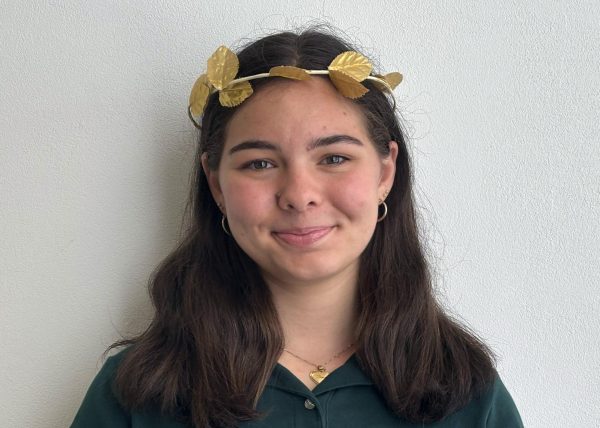Commentary: Stories live forever
Photo credit: Siena Ferraro
My opa and I stand together in front of his childhood home in Dresden, Germany. He and his family moved to this condo after the bombing of Dresden in 1945.
March 10, 2023
“The war is never truly over until you die.”
This pungent anecdote was one of many valuable morsels my grandfather, or Opa as I call him in German, shared with me over the course of one sunlit February afternoon. What began as a question raised over afternoon tea — “Opa, would you be willing to tell me what you remember from WWII?” — tenderly carried over into dinnertime chatter and Sunday morning coffee.
Story after story, each memory more lucid than the last, my Opa let me glimpse between the sensitive folds of his past. With each meticulously wordsmithed sentence, he articulated his traumatic experience as a 6-year-old boy enduring the 1945 bombing of Dresden, Germany and his life thereafter.
Over the course of three hours came shifted positions on the couch, brief nods in greeting from my cousins passing through the living room and, most prominently, pieces of Opa’s past presenting themselves like flickering video from a film reel, once black and white but now in screaming color.
It is true with spending an extended period of time with someone comes a multitude of stories — some in hastily shared snippets, some in hourlong sit-down conversations — but there is one specific aspect of Opa’s story that shattered my perspective of our heritage, of our family history and what we so often hear about WWII in history books and dramatized documentaries.
This story is from a few years after Opa’s city was bombarded and the second World War had subdued. On weekends, Dresden residents would often (and still do) travel around 20 minutes outside of the city to a dense, treelined forest area to relax in compact, box-like cabins.
Opa’s story is set in that same forest, under those same trees. He and his siblings trekked outside Dresden into the woods to go sledding by their family’s cabin on a nippy winter day. As they entered the forest and began to climb up a hill, chatter ringing through the air and sleds dragging behind them, the group encountered a tensely familiar sight: Russian soldiers.
At this point in his story, Opa described a deadening, thick silence before being questioned by the soldiers as to where they were going and what they were doing with those sleds. What started off as an unsettling interrogation morphed into a dwindling silence, then loose chatter and, finally, “Would you like to sled with us, too?”
Sure enough, that question prompted both hours of sledding down snowcapped hills and an unusual sight for the time period: Russians and Germans playing together. What was supposed to be an austerely upheld rivalry between the USSR and Germany was abandoned for a merry encounter and was certainly never to be mentioned in front of either party’s figures of authority — the solider’s commanding officers or Opa’s parents.
After finishing his story, Opa readjusted his glasses, let out a prolonged sigh and, once again, looked at me. Then, he said something that has stuck with me nearly a month later and instantly shattered my heart from the moment it exited his lips.
“We were all just kids.”
There was something heartbreakingly human about this story. At the risk of being hyperbolic, it simply blew my mind how a child’s inherent longing for simple playtime had the power to overcome heated political tensions and years of bloody warfare.
After processing this story, I found his experience during and after the war remarkable and, quite frankly, entirely unfathomable to an unsettling extent. I fell prey to an extraordinary amount of questions sprouting in my mind, but there was one which reigned most poignant: Why do I even care?
In an age of unbreakably constant newness — from an ever-updating cycle of decently funny TikTok videos to a myriad of new fashion trends making their posh debuts at Fashion Week runway shows — I’ve found that I often gravitate towards and consume the sparkly new topics of interest media moguls shove down my throat. It comes as no surprise that because of this harmful behavioral trend, I have started to pay less attention to past events, sometimes even venturing as far as to deem them ultimately irrelevant.
But that’s not to say getting swept up in the powerful current of newness is inevitable. In fact, it’s entirely preventable, but only if we take those five minutes to call our family members. Only if we ask those lingering questions about our family history. Only if we take action.
So I’m glad I took a break from the newness, from the gluttonous feast of immaterial Instagram posts and witticism-laced tweets the algorithm presents to me on a silver platter and instead took the time to sit with Opa, to excavate our family history and hear his experience firsthand.
Because, at the end of the day, even after our family members are no longer spending those sunlit February afternoons with us, what are we without our stories?









